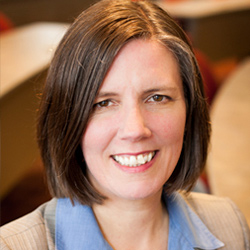Certificates of Advanced Graduate Study: Q&A with Assistant Dean of Graduate Programs Mary Cohen

This spring Northwestern University School of Professional Studies (SPS) launched Certificates of Advanced Graduate Study (COAGS), specialized certificates in targeted fields of study available to students who already hold a master’s degree. With more than 20 COAGS to choose from offered in a wide range of subjects — from advanced data science to British literature (and nearly everything in between) — the certificates offer students a unique opportunity to gain additional specializations beyond their degree, explore new fields or expand their skills. Most certificates are only four or six courses long, and are open to graduates of any master’s program — very few require course- or subject-specific prerequisites.
Post-graduate certificate programs aren’t a new concept to the field of higher education, but they are new to Northwestern University School of Professional Studies. To learn about what led to the launch of these ambitious programs and what these certificates can offer we talked to Mary Cohen, assistant dean of graduate programs at SPS.
Question: Why has SPS chosen to offer certificates of advanced graduate studies programs — and why now?
Mary Cohen: The COAGS came about after I began to hear from various places that there was a need for some sort of post-graduate certificate program. The first was from some of our current professional master’s degree students. We had a group who were saying, “I want to double specialize; I want to take classes beyond what’s required for the degree.” Previously there was no mechanism to formally recognize this additional coursework.
The second place was from alumni who wanted to take more classes, or to take advantage of new courses and specializations that were not available previously. COAGS allows alumni to continue taking courses at the graduate level and earn a new credential.
And the third place was from prospective students who already had advanced degrees, including MDs or PhDs. And they would say, “There are a number of these classes I’m interested in taking, but I don’t need another advanced degree.”
So COAGS really solved all three of those problems at once.
Q: Generally, why do you think it’s valuable to offer students continuing education after they already earned a master’s degree?
MC: Our careers are long; we have a number of students in our master’s programs who already have advanced degrees, so it is a reality that people change careers so many times throughout their lifetimes that sometimes one graduate degree doesn’t really serve them throughout their whole careers. In addition, professional fields can change rapidly, so even students who remain on one career path may find that they need to update their skills. Also, there are people who might have gotten a graduate degree in English who find themselves in a field like business or IT that has nothing to do with what their academic training was in. So for those kinds of students I think these certificates offer a really great opportunity to develop some additional high-level coursework and knowledge in a new field without necessarily having to take the full degree. Depending on the particular needs of the student, having more coursework — especially at the graduate level — can be extremely helpful.
Q: So to clarify, for most of the COAGS you don’t need to have a graduate degree in that particular field, correct? Just a graduate degree?
MC: Correct. The only certificates that require some coursework in the field are Analytics/Business Intelligence and Advanced Data Science. The remaining 22 certificates are very open to career changers or people who an interest in another field in which they’ve never had coursework.
Q: Twenty three certificates seem like a lot — is there any particular reason we’re offering that many?
MC: The certificate curriculum, for most part, aligns with the specializations in our various degree programs. And because we had number of very interesting specialization courses, we finally decided, “Why not offer the biggest variety possible?” These specializations were already successful in the graduate programs, and we had already gotten feedback from students that they were valuable so we thought, “If these are valuable to our current graduate degree seekers this would be a great way to structure our certificates.”
Q: What will the student experience be like for students in COAGS?
MC: It will depend on whether someone signed up for an on campus or an online program. In both cases, they take courses alongside current graduate students in the graduate program that corresponds to the certificate; they’re not segregated into their own classes. SPS courses typically feature very rich interactions from diverse student populations with various levels of experience. Our programs are enriched by students who are seasoned professionals, and our COAGS students will benefit from that.
Q: What kinds of people would you recommend enroll in a certificate of advanced graduate study program?
MC: Definitely career changers. Also, people who want to go in-depth in an area that they weren’t able to study in grad school — a graduate certificate is ideal for them.
I would also really encourage people who love learning to try something new. Even though the programs are designed for students to get more professional expertise and use these certificates to advance their careers, there’s also an opportunity for them to go outside their comfort zone. I have always felt the literature and liberal studies certificates would be useful to people who are lawyers or business people; I read articles all the time about how the standard MBA or law school curriculum doesn’t give people the kind of creative thinking you get in a humanities program, and I’m hoping people will look to these to supplement their skill set in creative ways. Education doesn’t always have to be about checking off the skills you need — sometimes what you need is a different perspective from a different field that you’re not familiar with.
